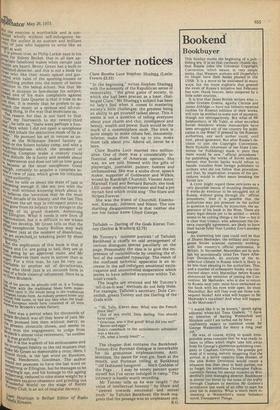Shorter notices
Clare Boothe Luce Stephen Shadegg (Leslie Frewin £3.33)
"In the beginning," writes Stephen Shadegg with the solemnity of the Republican sense of immortality, "the great game of society, in which she had been precast as a loser, challenged Clare." Mr Shadegg's subject has been no lady's fool when it comes to mastering society's little challenges: the greatest being an ability to get yourself talked about. This it seems is not a question of telling everyone about your charm and chic, intelligence and beauty, wealth and power. Such would be the mark of a commonplace snob. The trick is quite simply to make others feel, innocently, inferior; make them look up to you, make them talk about you. Above all, never be a bore.
Clare Boothe Luce married two millionaires. One of them was a considerably influential maker of American opinion. She was, we are told, blessed with the gifts of playwright, journalist, painter, hostess and ambassadress. She was a scuba diver, speech maker, supporter of Goldwater and Willkie, wooed by Randolph Churchill, Vincent Astor, Marshall Field and Bernard Baruch; she took LSD under medical supervision and had a pet mynah bird which could sing 'The Stars and Stripes Forever.' She was the friend of Churchill, Eisenhower, Kennedy, Johnson and Nixon. The one startling disappointment is that neither she nor her father knew Lloyd George.
Tallulah — Darling of the Gods Kieran Tunney (Secker & Warburg £2.75)
Mr Tunney's 'intimate portrait' of Tallulah Bankhead is chiefly an odd arrangement of various dialogues spaced peculiarly on the page. Presumably the idea is to give the impression of verisimilitude by creating the effect of the unedited typescript. The result of the confused technical apparatus is an increase in the self-indulgent emotional extravagance and uncontrolled desperation which seems to have infected everyone within Tallulah's reach.
The laughs are strained and Mr Tunney's ' tell-it-as-it-was ' methods do not help them. For example, Tallulah's secretary, Dola Cavendish, greets Tunney and the Darling of the Gods with — " Hi, Tallu, Kieran dear. What was the French place like?" " Out of this world, Dola darling. You should have come."
"Gracious, was it that good? What did you eat?" " Bacon and eggs."
Dola's comeback to the anticlimactic admission was a beauty: "Oh. what a lovely treat!" — The chapter that contains the BankheadTunney-Eric Portman dialogue is remarkable for its gratuitous unpleasantness. Antisemitism, the desire for neat gin, foam at the mouth, and Portman yelling at Bankhead "old fashioned hangover ... bitch Goddess of the Fags . . . I may be ninety percent queer myself but I've never indulged in camp." The intimacy is hardly worth recording. Mr Tunney tells us he was taught " the value of intellectual honesty" by Shaw and "steered towards emotional and sexual truth" by Tallulah Bankhead. His book suggests that the passage was an unpleasant one.


































 Previous page
Previous page